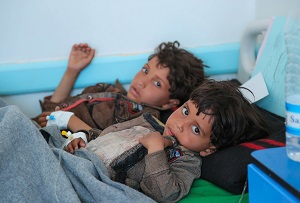Spread of acute watery diarrhoea and suspected cholera slows in Yemen amid unprecedented response efforts from unsung local heroes
Weekly number of reported new cases has declined by one third since June
The Yemeni people continue to be hit by an unprecedented and mostly man-made humanitarian crisis. Amid the suffering, ordinary Yemenis are leading a heroic daily fight against acute watery diarrhoea and cholera which is now paying off.

Children receive treatment for acute watery diarrhoea at the Sab'een Hospital in Sana'a, Yemen.
Thanks to an unparalleled response effort from local workers with the support of international NGOs and UN organisations, the weekly number of reported new cases has declined by one third since late June.
Health, water and sanitation personnel – who have not received salaries in over ten months – have been working tirelessly to stem the outbreak, which remains the worst in the world with over 550,000 suspected cases and more than 2,000 associated deaths recorded since April. More than half of the suspected cases are children.
Massive collective efforts to treat the sick and improve water and sanitation systems have helped slow the spread of the disease.
“We had difficulties managing the number of patients that came to us – many of them with severe conditions,” said Dr. Nahla Arishi, Deputy Manager and Head of the cholera treatment center at Alsadaqah Hospital in Aden City. “The hospital is crowded and beds and essential medicines are in short supply. But I can’t close the hospital’s doors and not accept children because there aren’t enough beds – I am a doctor and a mother too.”
A nationwide cholera awareness campaign is currently underway, mobilizing over 40,000 volunteers going house-to-house and reaching over 2.7 million families so far - approximately 80 per cent of households in Yemen. Through the campaign:
Nearly 12.5 million people across the country have received information on water disinfection, handwashing, sanitation and food safety, and
250,000 children and adults suffering from diarrhoea have been provided with oral rehydration salts and referred for treatment.
“Many of the children I have visited in their homes are thin and weak,” said Muthab Alburaik Salem, a community health volunteer working on the campaign. “It’s crucial to spread awareness among vulnerable communities so they are spared additional suffering. I fear that my own children will be exposed to diseases – so I treat all children I’m working with in Yemen as if they were my own,” adds Muthab, a mother of two.
Despite these recent gains, the fight against cholera is far from over. Amid continued violence, water and sanitation systems are collapsing, and more than half of Yemen’s health facilities are out of service, cutting off almost 15 million people from safe water and access to basic healthcare. The country remains on the brink of famine, with an estimated 385,000 children suffering from severe acute malnutrition, putting them at heightened risk of acute watery diarrhoea and cholera.
To maintain the gains made, the international community must step up its support for rebuilding health, water and sanitation facilities and invest in preventing future outbreaks.
But without an end to the fighting, more children will die. UNICEF calls on all parties to the conflict to find a peaceful political solution to the violence in Yemen to save children’s lives and offer them the prospect of a brighter future.
Source:United Nations Children's Fund
- 383 reads
Human Rights
Fostering a More Humane World: The 28th Eurasian Economic Summi

Conscience, Hope, and Action: Keys to Global Peace and Sustainability

Ringing FOWPAL’s Peace Bell for the World:Nobel Peace Prize Laureates’ Visions and Actions

Protecting the World’s Cultural Diversity for a Sustainable Future

Puppet Show I International Friendship Day 2020

